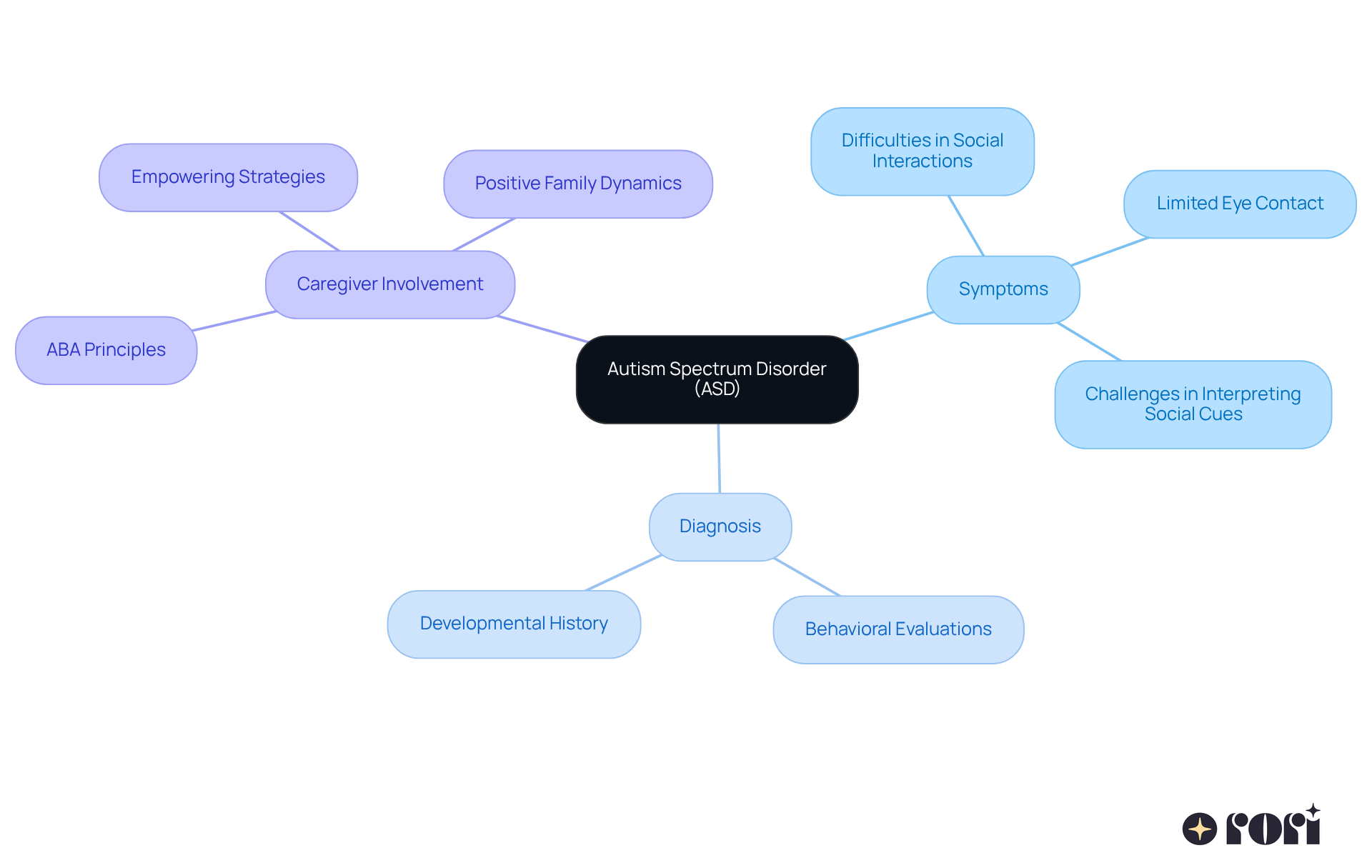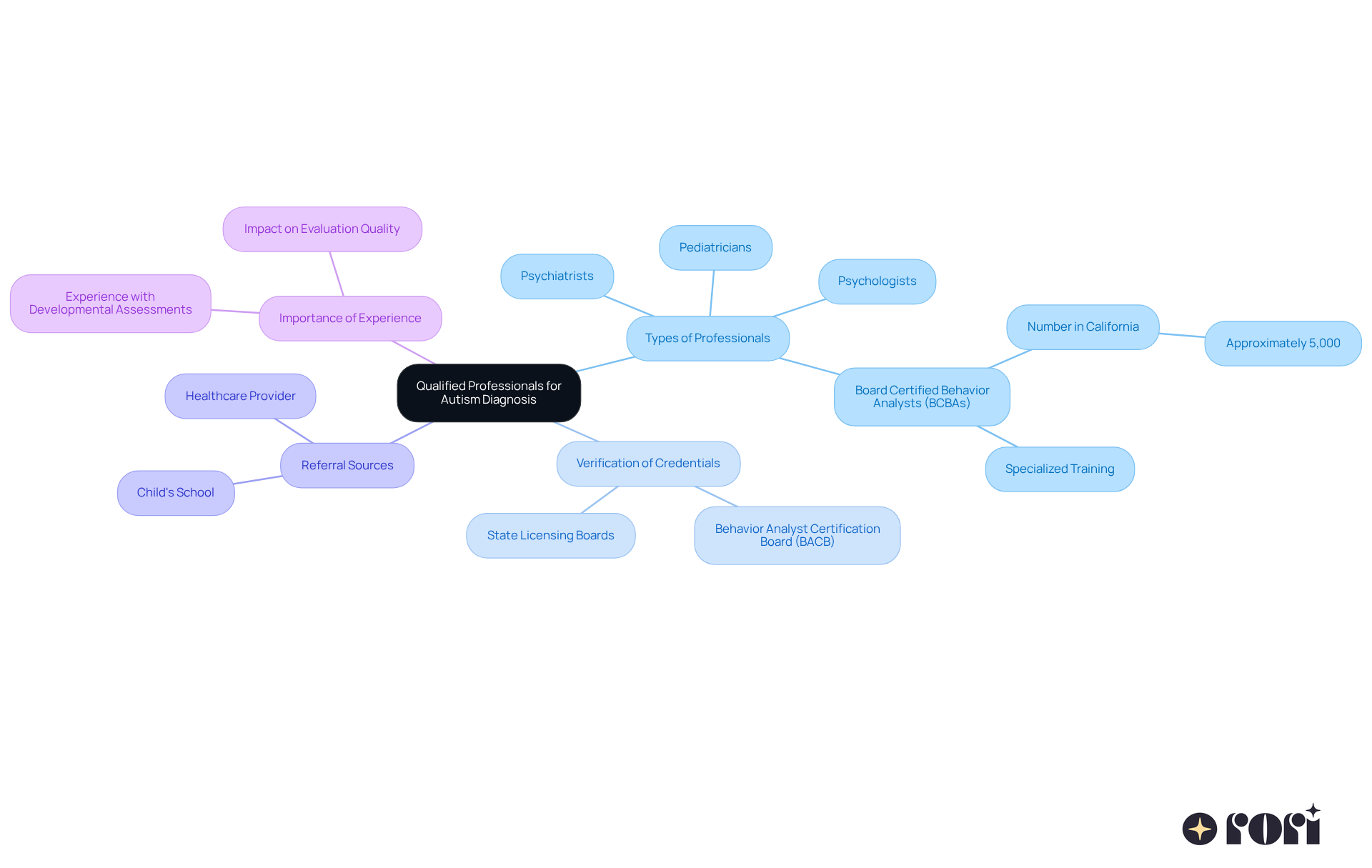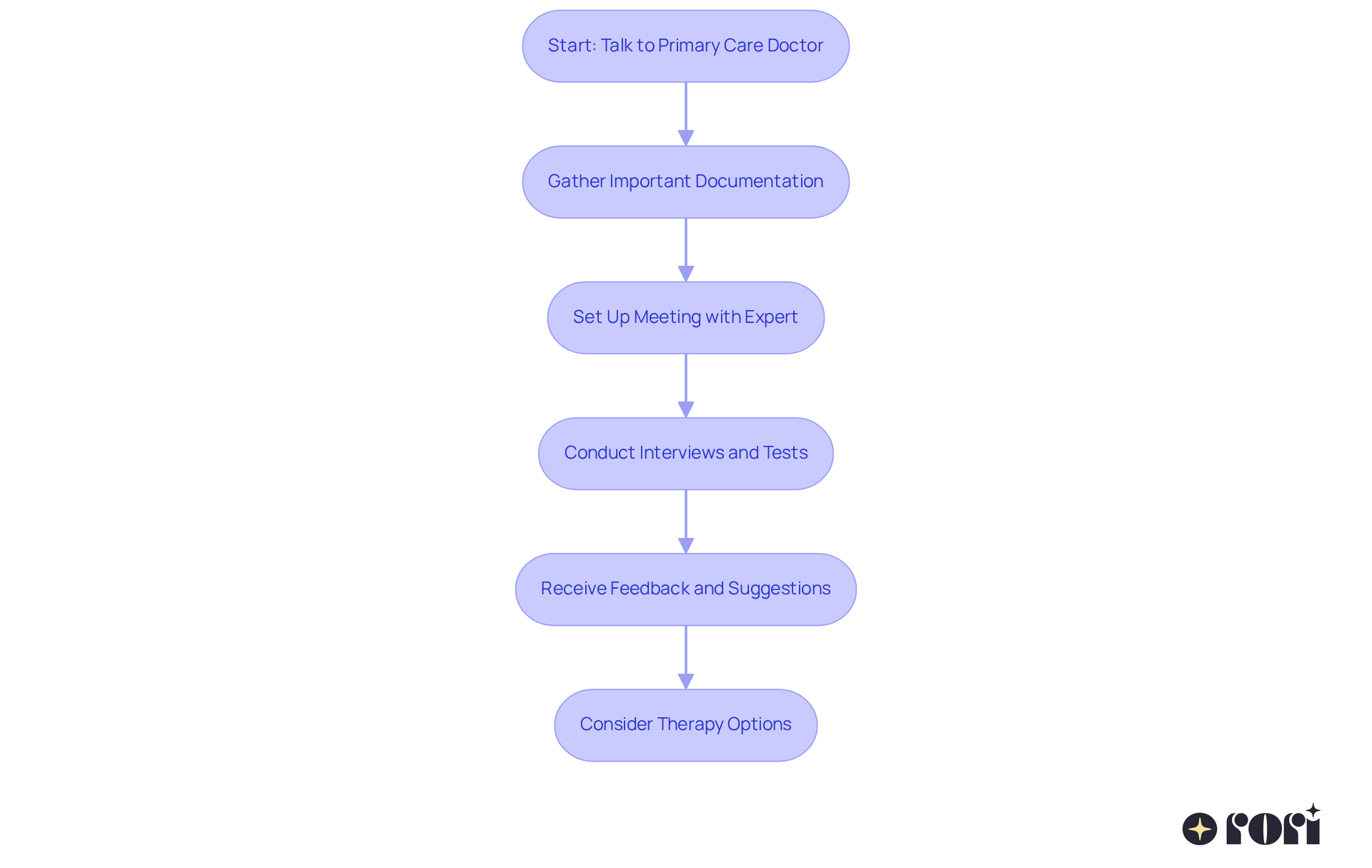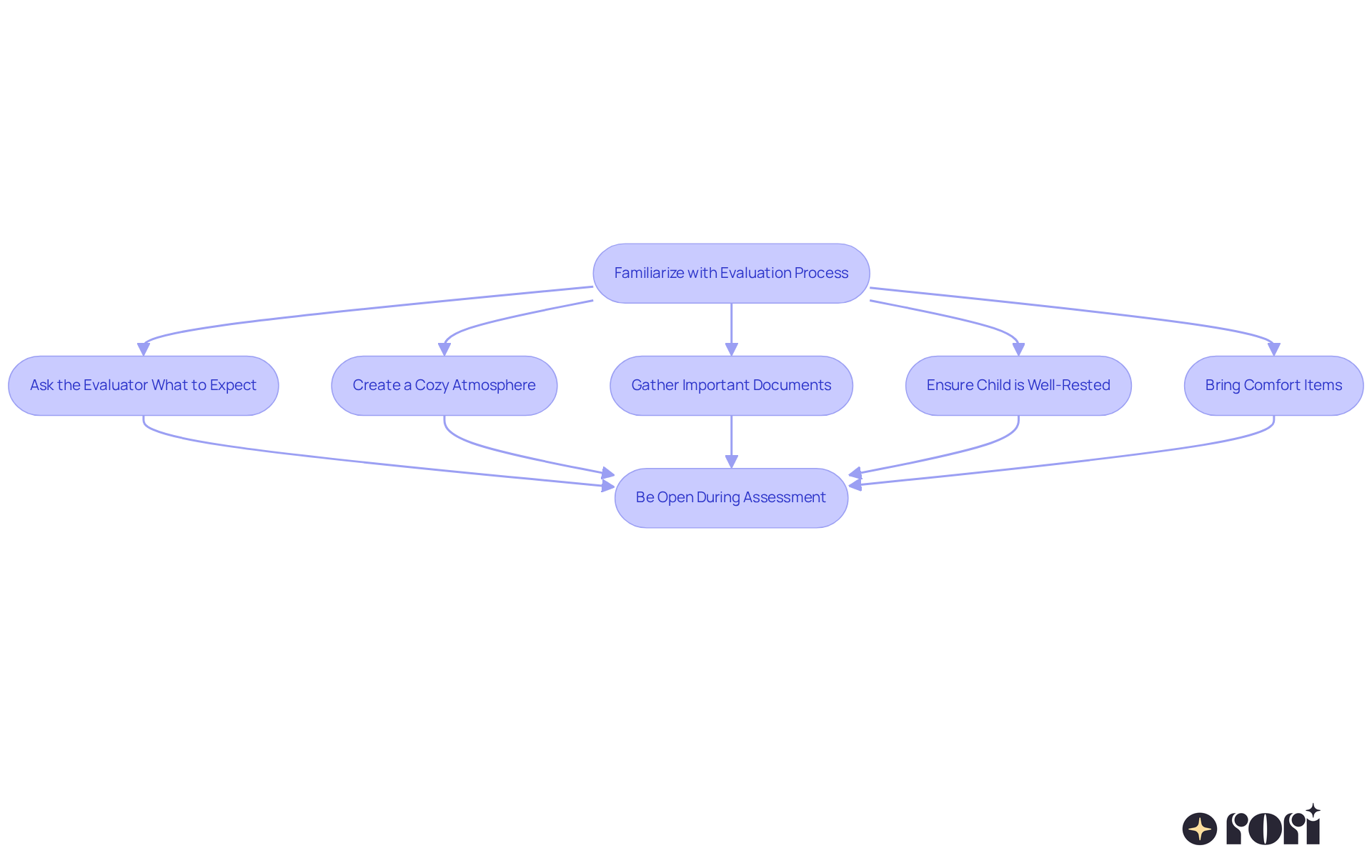This article is all about who can diagnose autism in California. It highlights the different qualified professionals involved in the diagnostic process, like pediatricians, psychologists, and Board Certified Behavior Analysts (BCBAs). Choosing experienced practitioners is key, and preparing well for the evaluation is crucial to ensure accurate assessments and tailored interventions for children with Autism Spectrum Disorder (ASD).
Navigating this journey can be challenging for parents, but you’re not alone! Selecting the right professionals can make a world of difference. Let’s explore this together and ensure your child gets the best support possible. Remember, taking that first step is important, and we’re here to help you every step of the way!
Understanding Autism Spectrum Disorder (ASD) is crucial for parents and caregivers as they navigate the complexities of developmental challenges. 🌱 With symptoms that can vary widely among individuals, recognizing the signs early can lead to timely interventions and better outcomes for children. This guide explores the essential steps to obtain a diagnosis in California, highlighting the roles of qualified professionals and the evaluation process. But with so many options and potential hurdles, how can parents ensure they are making the right choices for their child's assessment and support? Let’s explore this together!
Autism Spectrum Disorder (ASD) is a complex developmental disorder that presents a variety of challenges in social skills, communication, and repetitive behaviors. It's essential for parents and caregivers to recognize the diverse ways ASD can manifest, as symptoms can differ significantly from one individual to another. Common signs include:
Spotting these indicators early is crucial because timely intervention can lead to more effective support and better outcomes for young individuals.
The process of diagnosing ASD typically involves a thorough assessment by those who can diagnose autism in California, including behavioral evaluations and a detailed developmental history. This comprehensive approach is key to determining the best interventions and support tailored to each child's unique needs. Recent research shows that early detection is associated with better long-term outcomes, highlighting the importance of being vigilant in recognizing potential signs of autism. By identifying these signs and seeking assessment from professionals who can diagnose autism in California when necessary, parents can play a vital role in their child's developmental journey.
Alongside professional evaluations, Rori Care offers a variety of services designed to empower caregivers with ABA principles and strategies. These services enhance caregivers' ability to support their child's behavioral goals and promote independence. By actively engaging in their child's development and understanding therapeutic strategies, caregivers can make informed decisions that positively influence their child's progress. This involvement not only leads to improved behavioral outcomes but also empowers caregivers, reducing stress and enhancing family dynamics. Let’s explore this together!

In California, a variety of professionals can help identify developmental disorders, such as pediatricians, psychologists, and psychiatrists. When you're looking for a diagnosis, it's important to choose practitioners who specialize in developmental disorders and have significant experience with autism spectrum disorder (ASD). As of 2025, there are about 5,000 Board Certified Behavior Analysts (BCBAs) in California, making them a fantastic resource for thorough assessments. BCBAs, along with licensed clinical psychologists, are especially equipped to conduct comprehensive evaluations thanks to their specialized training in behavior analysis.
To ensure you're working with a qualified professional, take a moment to verify their credentials by checking their certification status through the Behavior Analyst Certification Board (BACB) or relevant state licensing boards. It’s also a good idea to ask about their specific experience with developmental assessments, as this can greatly impact the quality of the evaluation. Plus, getting referrals from trusted sources, like your child’s school or healthcare provider, can help you find experts known for their skills in diagnosing developmental disorders. This proactive approach can lead to a more accurate and supportive assessment process for your child. Let’s explore this together!

Starting an autism assessment can feel overwhelming, but it all begins with a simple conversation. Talk to your child’s primary care doctor about your concerns; they can connect you with specialists who can diagnose autism in California and may even conduct some preliminary screenings. It’s a good idea to gather important documentation, like developmental milestones and behavioral observations, to share with the evaluator. When you set up a meeting with a skilled expert, make sure your little one is well-rested and comfortable. During the assessment, the professional will typically conduct interviews, standardized tests, and observations to evaluate your child’s behavior and development. They might use tools like the Autism Diagnostic Observation Schedule, Second Edition (ADOS-2) and the Autism Diagnostic Interview, Revised (ADI-R). After the review, you’ll receive feedback and suggestions for next steps, which could include therapy options or further evaluations.
Healthcare providers emphasize the importance of being well-prepared for the evaluation. As one specialist puts it, "An autism assessment is all about understanding your child, and no one understands your child better than you do." This preparation can really enhance the assessment experience, leading to more accurate diagnoses and tailored treatment plans. Plus, keeping track of specific behaviors, routines, and preferences can provide valuable insights during the assessment process.
In California, wait times for assessments can vary, and it’s important for parents to be aware that delays are common due to high demand for services from professionals who can diagnose autism in California. To prepare for evaluations related to developmental disorders, consider:
By taking these steps, you can help make the assessment process smoother and ensure that your child’s unique needs are effectively addressed. After the assessment, think about reaching out to Rori Care’s Board Certified Behavior Analyst for free consultations, which can assist you in accessing insurance-covered services and creating personalized treatment plans tailored to your child’s progress. Notably, studies show that 90% of children make significant gains when recommended hours of ABA therapy are consistently implemented with active caregiver involvement, making it a scientifically validated treatment for developmental disorders. Let’s explore this together!

Getting ready for an autism diagnostic evaluation can feel a bit overwhelming, but it doesn't have to be! Start by familiarizing yourself with the evaluation process. Ask the evaluator what to expect—this can really help ease any worries you might have.
Creating a cozy atmosphere for your child is key. Talk about the evaluation in an encouraging way, emphasizing that it's a helpful step for them. Gather any important documents, like medical records and developmental history, to give the evaluator a complete picture of your child's background.
On the day of the evaluation, make sure your child is well-rested. Bringing along a favorite toy or blanket can provide them with comfort and security. Lastly, be open and honest during the assessment; this will give the evaluator valuable insights into your child's behavior and needs. Remember, you're not alone in this—let’s explore this together!

Understanding who can diagnose Autism Spectrum Disorder (ASD) in California is crucial for parents and caregivers navigating this complex process. Early detection is key, and knowing the qualifications of professionals involved can make a world of difference. By recognizing the signs of autism and knowing where to turn for help, caregivers can significantly influence their child's developmental journey.
It's essential to consult qualified professionals like:
who specialize in ASD evaluations. Preparing for assessments is also important—gathering relevant documentation and understanding the evaluation process can really set the stage for effective intervention and support strategies.
Ultimately, the journey toward an autism diagnosis is a collaborative effort between caregivers and professionals. By being proactive, informed, and engaged, families can ensure their children receive the tailored support they need. Taking these steps seriously can lead to significant improvements in a child's development and quality of life. Engaging with resources like Rori Care can further enhance this journey, making it an invaluable part of the support system for families facing the challenges of autism. Let’s explore this together, and remember, we’re here to help you every step of the way!
What is Autism Spectrum Disorder (ASD)?
Autism Spectrum Disorder (ASD) is a complex developmental disorder that presents challenges in social skills, communication, and repetitive behaviors.
What are common signs of ASD?
Common signs of ASD include difficulties in social interactions, limited eye contact, and challenges in interpreting social cues.
Why is early detection of ASD important?
Early detection of ASD is crucial because timely intervention can lead to more effective support and better outcomes for young individuals.
How is ASD diagnosed?
The diagnosis of ASD typically involves a thorough assessment by professionals, including behavioral evaluations and a detailed developmental history, to determine the best interventions tailored to each child's unique needs.
What role do parents and caregivers play in recognizing ASD?
Parents and caregivers play a vital role in recognizing potential signs of autism and seeking assessment from professionals, which can positively influence their child's developmental journey.
What services does Rori Care offer to caregivers?
Rori Care offers a variety of services designed to empower caregivers with ABA principles and strategies, enhancing their ability to support their child's behavioral goals and promote independence.
How does caregiver involvement affect a child's development?
Active caregiver involvement leads to improved behavioral outcomes, reduces stress, and enhances family dynamics, ultimately positively influencing the child's progress.